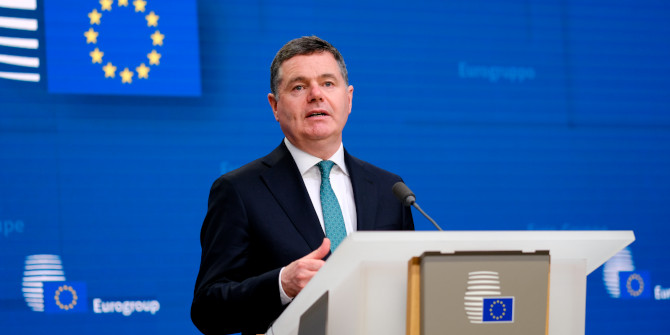Six years after its emergence in the eastern German state of Saxony, the far-right populist movement ‘Pegida’ still polarises German politics and society. Sabine Volk argues that the movement’s continued popularity highlights the stark divisions that persist within Germany.
In October, the Dresden-based far-right populist group “Patriotic Europeans against the Islamisation of the Occident” (Pegida) celebrated yet another anniversary. For six years now, the protest movement has been known for its regular street demonstrations against immigration and Islam, the German government and political establishment, as well as the liberal press and public.
Pegida has contributed to Dresden’s image as a city with a ‘Nazi problem’, as well as to the increasing polarisation of German society, three decades after the country’s reunification. Recent ethnographic research I have conducted on far-right politics in eastern Germany demonstrates this polarisation on the streets of Dresden – a city which since 1989 had been positively associated with Germany’s “only successful revolution from below”.
Far-right protest and counter-protest
This year, Pegida celebrated its anniversary not as planned with the usual large-scale rally on one of the most picturesque squares in Dresden’s historical centre, but with a so-called action week set up at the very last moment. Over a period of five days, Pegida organised small-scale gatherings in Dresden and its surroundings, as well as in the city of Cottbus in the eastern German state of Brandenburg.
Whereas the first event followed the procedures institutionalised throughout the past six years, the following three included novel ‘open mic’ sessions in which the public could voice their concerns about German politics. The final event in Cottbus gathered some of the most prominent politicians of the far-right Alternative for Germany (AfD), including Alexander Gauland, the party’s honorary chairman, and Björn Höcke, parliamentary leader in the state of Thuringia and former leader of the party’s extremist faction ‘The Wing’.
All five rallies were disturbed by noisy left-wing counter-protesters. The largest and broadest counter-mobilisations, however, took place on Sunday, 25 October, the date of Pegida’s initially planned anniversary. That Sunday, it was possible to publicly express one’s opposition to Pegida in at least six events spread out across Dresden, including rallies, bike rallies, and concerts – though none took place next to Pegida’s events. Remarkably, these were not only the usual leftist events gathering mostly young, alternative people with their drums and whistles, but also included participation from members of conservative parties, namely the Christian Democrats (CDU) and the Liberal Democrats (FDP), who mobilised for a ‘civilian protest’ against the far right – the second time they have done so.
Covid-19 disrupts Pegida’s protest ritual
Pegida had called off its original large-scale rally on Dresden’s Neumarkt at the very last moment. According to chairman Lutz Bachmann, the cancellation was due to the national lockdowns associated with Covid-19, which limited the possibilities for international travel. Specifically, the invited guests from outside Germany, including influential far-right activists Martin Sellner from Austria and Tommy Robinson from England, were not able to travel to Dresden. Sellner had been one of the most celebrated speakers last year.
Both the left and the conservatives claimed the cancellation as a victory for ‘civil society in Dresden’. After all, counter-protesters such as the brass band ‘Banda Internationale’ have long been lobbying to ban Pegida from the city centre. However, it is worth underlining that it was the pandemic, rather than political pressure, that temporarily broke Pegida’s regular protest ritual. Restrictions on public assembly to tackle Covid-19 have previously forced the movement to adapt, for instance by engaging in virtual protest activity for a short period of time, or by suspending its ‘evening walk’. Rather than being viewed as a failure, the anniversary provided an opportunity for Pegida to present itself as a creative and flexible movement that listens to the ‘will of the people’ via its open-mic sessions.
A polarised society
In these sunny autumn days in Saxony and Brandenburg, the polarisation of German society is palpable. The dividing line not only runs between Pegida and its political opponents. Rather, the parallel organisation of no less than six different counter-protests reveals the divisions that also exist between the CDU and FDP on one side, and various left-wing actors on the other.
In Dresden and across eastern Germany, a joint initiative for democracy by conservative and left-wing actors is barely conceivable. Conservative aversion against ‘the left’ is strong even thirty years after the demise of the state socialist system of the German Democratic Republic (GDR). Hence, the CDU and FDP not only denounced Pegida’s actions but also took the opportunity to decry far-left extremism – a jibe against the leftist counter-protesters standing just a few hundred metres away.
A similarly polarised situation can be observed in the Saxon state parliament. Although the CDU entered a coalition with the Social Democrats (SPD) and the Green party following the latest regional elections in autumn 2019, ideological divisions remain strong. On this year’s German Unity Day of all things, the left-wing coalition partners stayed away from the official celebrations due to their rejection of the speaker chosen by the CDU. The conservatives thus remained in the controversial company of AfD parliamentarians, evoking cumbersome memories of the darkest period of German history. It is therefore difficult to deny that, thirty years after reunification, German politics and society are dangerously divided. Hardened fronts particularly characterise Saxony, which was the cradle of the peaceful revolution in the GDR.
The far right for freedom and the rule of law?
On the first day of Pegida’s action week, leading activist Wolfgang Taufkirch proclaimed that “after thirty years, the natives are ready for a new revolution!” Minutes later, the crowd chanted “We are the people! We are the people!”, constructing a direct connection between Pegida’s public protest and the peaceful Monday Demonstrations which contributed to the demise of the GDR.
On the last day of the week, AfD politician Gauland explained the aims of this so-called revolution, namely the maintenance of democracy, rule of law, and civil rights. In his speech to the Cottbus public, he denounced chancellor Angela Merkel’s politics during the pandemic as a “corona dictatorship” led by a “war cabinet”, and praised the AfD as the last party “which defends the German constitution unconditionally”. His party colleague Höcke confirmed: “I want everybody to understand the AfD as the party of freedom and rule of law!”
The German far right thus used Pegida’s six-year anniversary as an opportunity to strengthen and further develop the narrative of far-right politics as the guarantor of democracy and the rule of law, aligning their rhetoric with the discourse on individual freedoms which had arisen amidst the pandemic. Although established far-right actors such as Pegida and the AfD had maintained distance towards the demonstrations against the government’s policies throughout the better part of 2020, speakers referred to the ‘corona-sceptics’ positively this time. While German politics and society are increasingly polarised, new coalitions between both parliamentary and extra-parliamentary far right and conspiracy theorists might be underway.
Note: The research on which this article is based is part of a project that has received funding from the European Union’s Horizon 2020 research and innovation programme under grant agreement No. 765224. The article gives the views of the author, not the position of EUROPP – European Politics and Policy or the London School of Economics. Featured image credit: Steve Grant (CC BY-NC-ND 2.0)






Surely a piece intended to be considered as “academic” should meet certain standards ?
e.g. definitions being clear – with evidence to support their application ?
And surely an academic piece should be detached and objective rather than standing on one side looking at another ?
So why isn’t “far right” and “populist” defined ?
There seems to be an endless stream of groups that are labelled “far right” – but rarely is any evidence provided – let alone a definition.
All we know is is that these groups are “othered” by commentators, simply declaring them to be “far right” – along with the clear implication that this makes them “beyond the pale”.
Sadly this author seems no different.
It seems no co-incidence that “far right” and “populist” lack parentheses – as if there is no doubt about these tags.
So why does the “left” get parentheses ?
Surely the inference is that the allegation of “leftness” is questionable (unlike assertions of “far right”) ?
And the article concludes with “The German far right …. aligning their rhetoric”.
Is this not othering ?
Perhaps the most egregious piece of comment (hardly fact) is:
“The conservatives thus remained in the controversial company of AfD parliamentarians, evoking cumbersome memories of the darkest period of German history.”
Does the author deny linking the AfD with Nazism ?
This despite also quoting the AfD as “denouncing” a “corona dictatorship”.
It’s a curious looking glass world when libertarians are said to evoke memories of authoritarians !
2/10